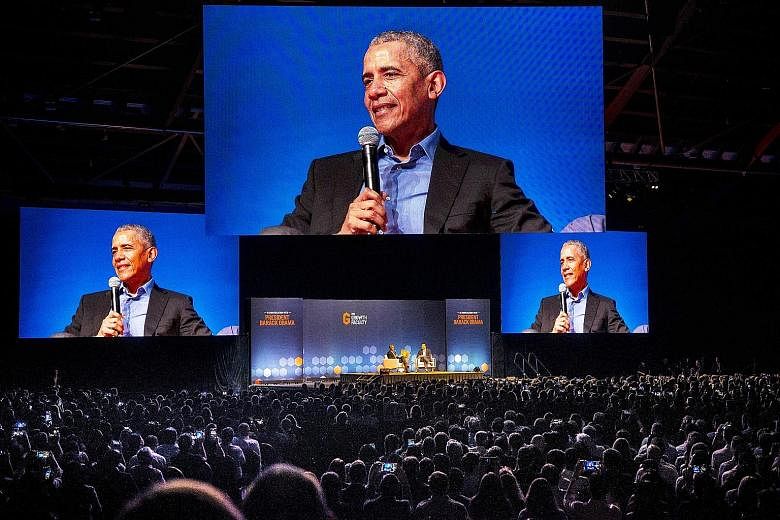To Mr Barack Obama, who crafted the essential rules for winning elections in the digital age, the buck is back with the voter.
Or, as the man who collected the highest number of votes ever cast for a White House candidate in his improbable bid to become America's first black president put it: The world today faces not just a crisis of leadership but a crisis of citizenship.
Mr Obama, 58, retired three years ago after holding office for eight years and remains an inspirational figure across the globe.
His pronouncements on whether leaders are letting the world down came during a talk yesterday, the last day of his four-day trip to Singapore during which he also attended a charity event and called on Prime Minister Lee Hsien Loong.
Asked by the moderator of an hour-long conversation if today's global leadership should be a source of worry, Mr Obama made no mention of his successor Donald Trump, whose winning slogan was a protectionist "America First".
Known for a transactional approach to office, Mr Trump lost little time in overturning key Obama policies - from backing out of what would have been the world's largest free trade pact, the Trans-Pacific Partnership, to walking out of the Paris climate accord and the Iran nuclear accord.
Nevertheless, Mr Obama's message was pointed enough and resonated with an audience of business executives packed into a hall in Singapore Expo on a rainy working day.
It was a call to both leaders and their followers to embrace, not shun, the complexity of the evermore interconnected world.
"What we need, in terms of global leadership, is people who are comfortable with and understand complexities," he said, before adding: "But that, of course, requires citizens to be comfortable (with) and understand complexity."
Responding to a question from Mr Nicholas Fang, director of security and global affairs at the Singapore Institute of International Affairs, Mr Obama's argument was lucid.
"Part of the challenge we have as humans is that when things get complicated and confusing, we tend to want to block it out and look for simple answers," he said.
"So we are, often times, getting a leadership that reflects our own insecurities and problems.
"We are electing somebody whose basic message is that all your problems are a result of that group over there that's not like us.
"We are electing people who say there is no such thing as climate change so that you don't even have to worry about it.
"That's not just the leader's fault. It's not just a challenge of leadership, it's a challenge of global citizenship."
Instead, he pointed out: "What we should expect our leaders to be doing is to help all of us understand the difficult decisions we have to make... that will bring the people together rather than dividing them."
Asked to name the three things that still keep him awake at night, he listed political polarisation, the unexpected corruption of social media and climate change.
Blue-collar workers in the developed world were losing jobs and status as a consequence of globalisation, outsourcing and automation, he noted.
"There was a backlash, sometimes from the left, more often from the right. And a fallback to tribalism, racism, misogyny, ethnic or sectarian conflicts and strongmen who would come in and exploit some of those divisions."
He was considered a master in the use of social media, the other source of his anxiety today.
"I would not have been elected had it not been for our ability to communicate and generate enthusiasm among volunteers and small donors through social media," he said.
"But what we have seen is an increase in the use of that technology to promulgate falsehoods and narratives of hate."
Still, he remains a dealer in hope and change, the two themes of his own presidential campaign.
Mr Obama, who admitted to being "annoyed" when he won the Nobel Peace Prize "too early" - just nine months into his first term - sees the average Joe as the solution.
"It's going to take all of us, not just a single leader, not looking for a messiah somewhere, but each of us figuring how do we contribute in our communities to creating better compassion, justice, equity."


